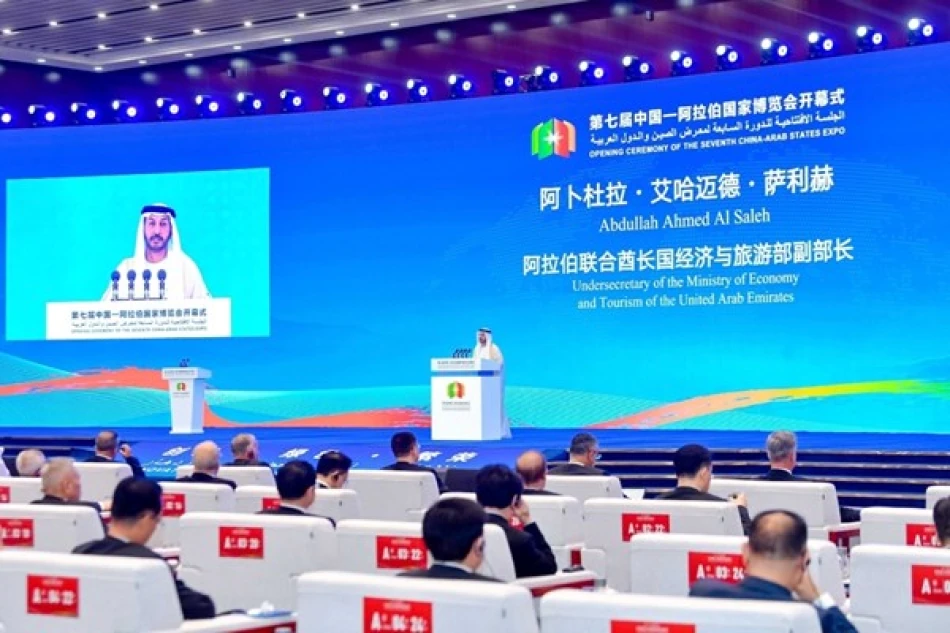
UAE Shines Bright as Guest of Honor at China-Arab States Expo in Yinchuan
UAE and China Deepen Economic Ties as Trade Partnership Reaches $90 Billion
The UAE's participation as guest of honor at China's premier Arab trade expo signals a strategic deepening of what has become the most significant economic partnership between China and the Middle East. With non-oil trade reaching $90 billion in 2024 and Chinese investment surging 95% year-over-year, the relationship positions the Emirates as China's gateway to regional markets while offering Beijing a crucial foothold in global trade flows.
Strategic Showcase at China-Arab Expo
The UAE commanded the largest national pavilion at the seventh China-Arab States Expo held in Yinchuan from August 28-31, 2025. The exhibition, themed "Focus on Economic Development and Enhance Mutual Cooperation," served as more than a trade show—it represented a diplomatic statement about the UAE's role in China's Belt and Road Initiative and broader Middle Eastern strategy.
A 50-member UAE delegation, led by Ambassador Hussein Ibrahim Al Hammadi and Ministry of Economy and Tourism Undersecretary Abdullah Ahmed Al Saleh, showcased opportunities across emerging sectors including green energy, advanced manufacturing, technology, agriculture, and small-to-medium enterprises. The breadth of sectors reflects both countries' pivot toward economic diversification beyond traditional energy and manufacturing bases.
Beyond Traditional Trade Partnerships
The UAE's guest of honor status carries particular weight given China's careful diplomatic protocol. This recognition acknowledges the Emirates' unique position as China's primary non-oil trading partner in the Middle East and Africa, while serving as a transit point for over 60% of Chinese exports to the broader region.
This arrangement mirrors successful trade hub strategies employed by Singapore in Southeast Asia and Dubai's own model of becoming a regional commercial center. The UAE essentially functions as China's distribution network for Middle Eastern and African markets, reducing logistics costs and political risks for Chinese exporters.
Record-Breaking Economic Performance
The numbers behind the partnership reveal its strategic importance. Non-oil trade between the countries reached approximately $90 billion in 2024, with first-half 2025 figures showing 15.6% growth to nearly $50 billion. This trajectory positions the bilateral relationship to potentially exceed $100 billion annually within two years.
Investment Flows Signal Long-Term Commitment
UAE investments in China jumped 95% in 2023 to $4.5 billion, indicating Emirati confidence in Chinese market opportunities beyond simple trade relationships. Conversely, China ranks as the UAE's third-largest source of foreign direct investment with $9 billion committed through 2023.
These investment patterns suggest both countries view their partnership as permanent infrastructure rather than cyclical trade relationships. Chinese companies are establishing regional headquarters in Dubai and Abu Dhabi, while Emirati sovereign wealth funds are taking stakes in Chinese technology and manufacturing companies.
Tourism and Connectivity Drive Cultural Integration
Over one million Chinese tourists visited the UAE in 2024, supported by more than 110 weekly direct flights between the countries. This tourism surge reflects growing middle-class Chinese wealth and the UAE's success in marketing itself as a luxury destination accessible to Asian travelers.
The connectivity extends beyond leisure travel. Direct flight capacity enables just-in-time manufacturing and e-commerce logistics that support the broader trade relationship. This mirrors the connectivity strategies that made Dubai a global aviation hub and positions it advantageously as Chinese companies expand globally.
Market Implications and Future Outlook
For global investors, the UAE-China partnership represents a template for how middle powers can leverage geographic advantages in an increasingly multipolar world. The UAE's success in becoming China's regional hub offers lessons for other countries seeking to benefit from Chinese economic expansion without full political alignment.
Regional Competition and Positioning
The partnership also intensifies regional competition, particularly with Saudi Arabia's Vision 2030 initiatives and Qatar's efforts to diversify beyond energy exports. The UAE's first-mover advantage in Chinese partnership may prove difficult for regional rivals to replicate, especially given the infrastructure investments and business relationships already established.
The relationship's evolution will likely influence broader Middle Eastern geopolitics, as other Arab states seek similar partnerships with China while managing relationships with traditional Western allies. The UAE's model of maintaining strong ties with both China and Western countries may become increasingly difficult to sustain as global tensions rise.
The UAE-China economic partnership has moved beyond traditional trade relationships into strategic interdependence, with both countries viewing their collaboration as essential infrastructure for future growth rather than opportunistic commerce.
Most Viewed News

 Layla Al Mansoori
Layla Al Mansoori






